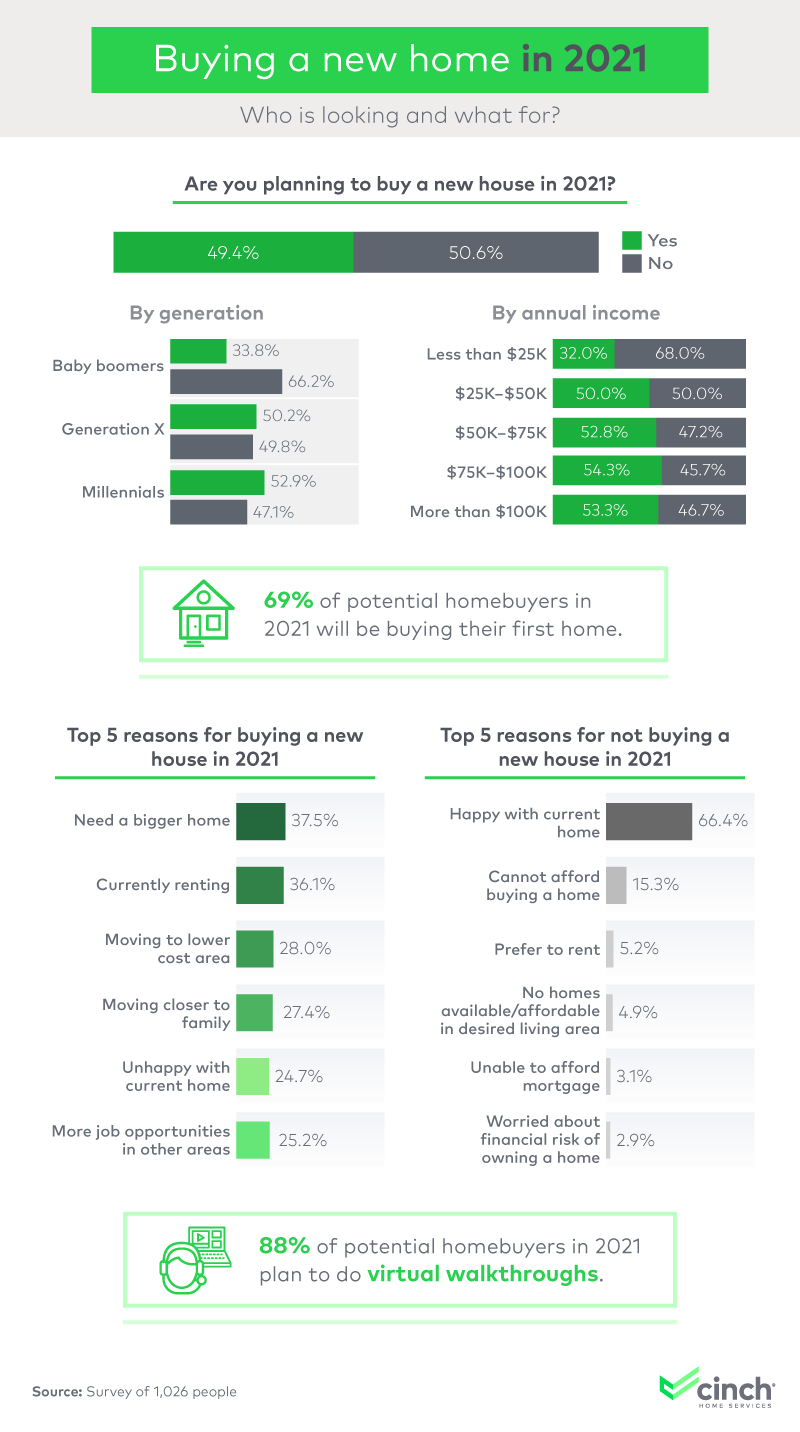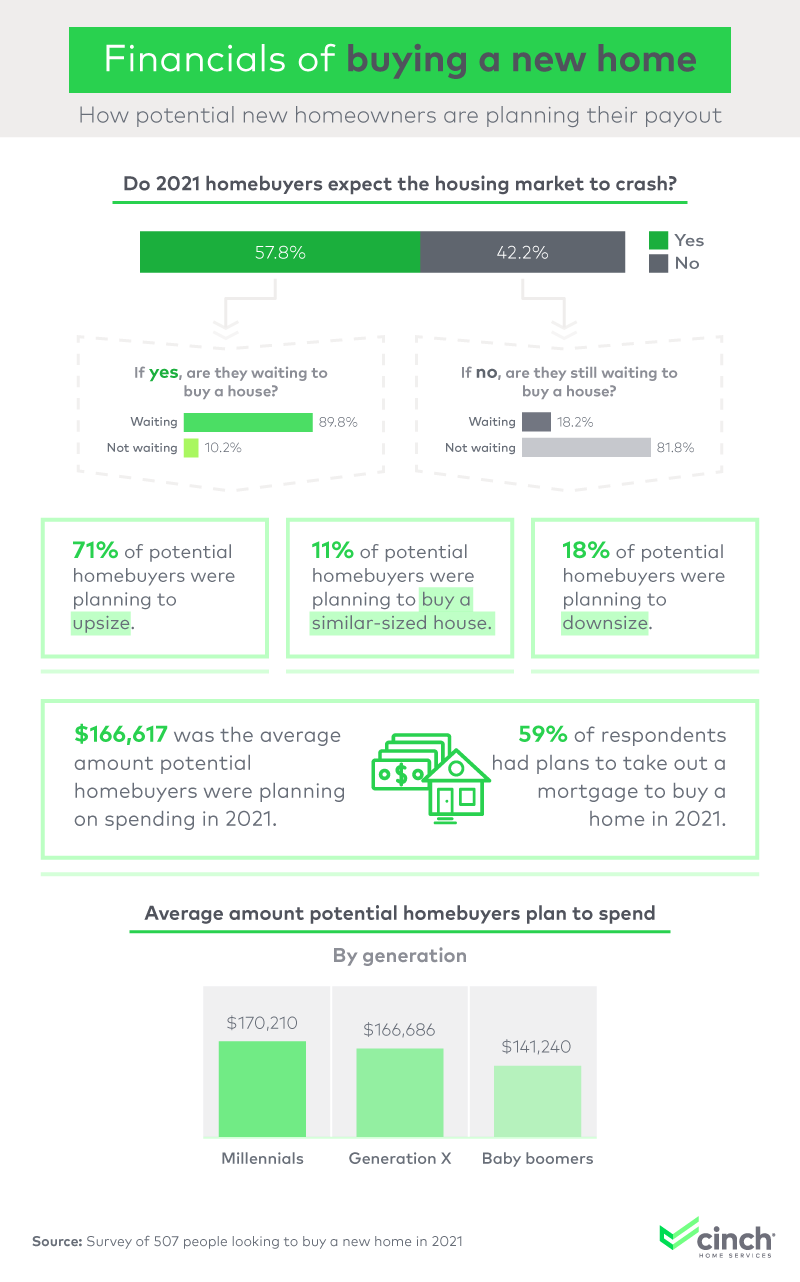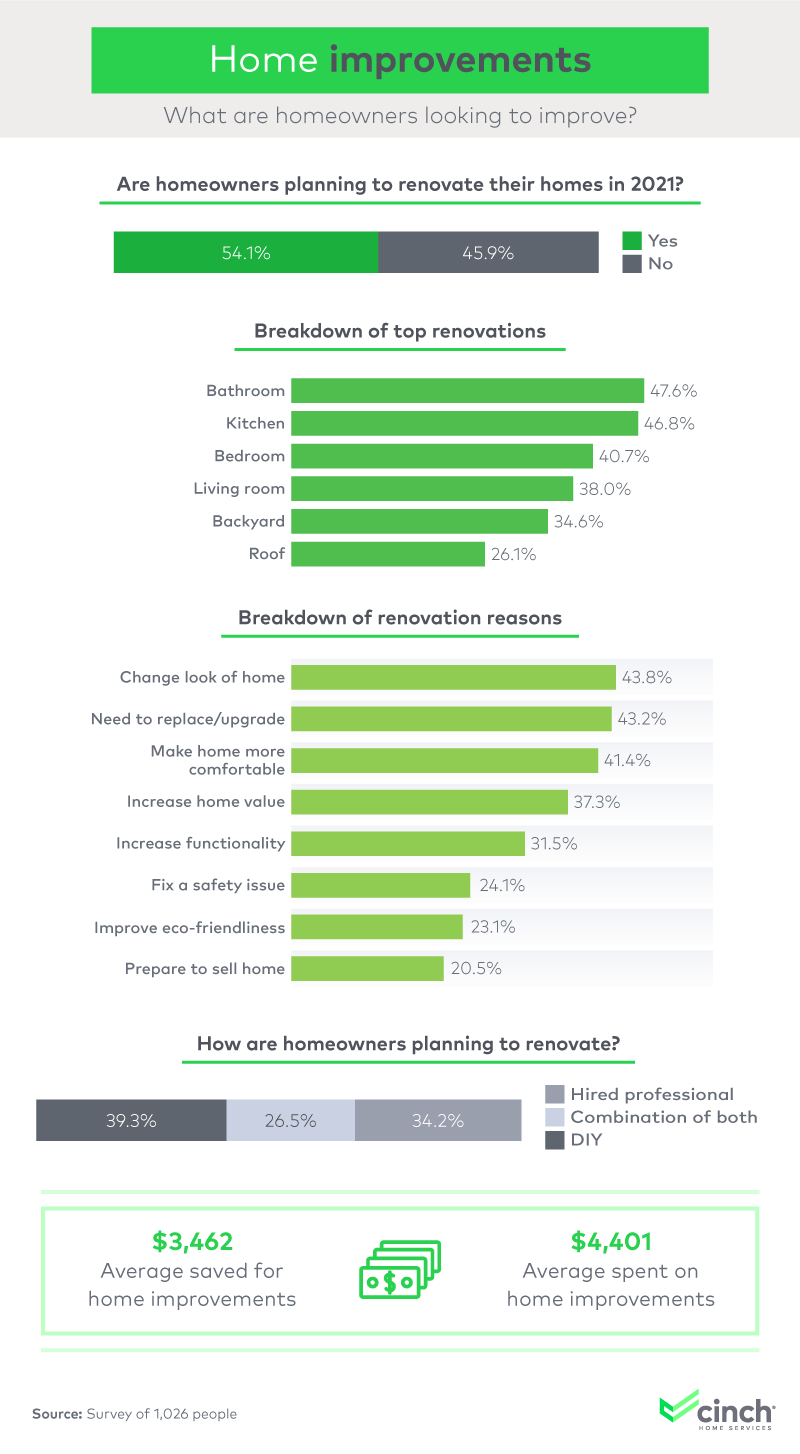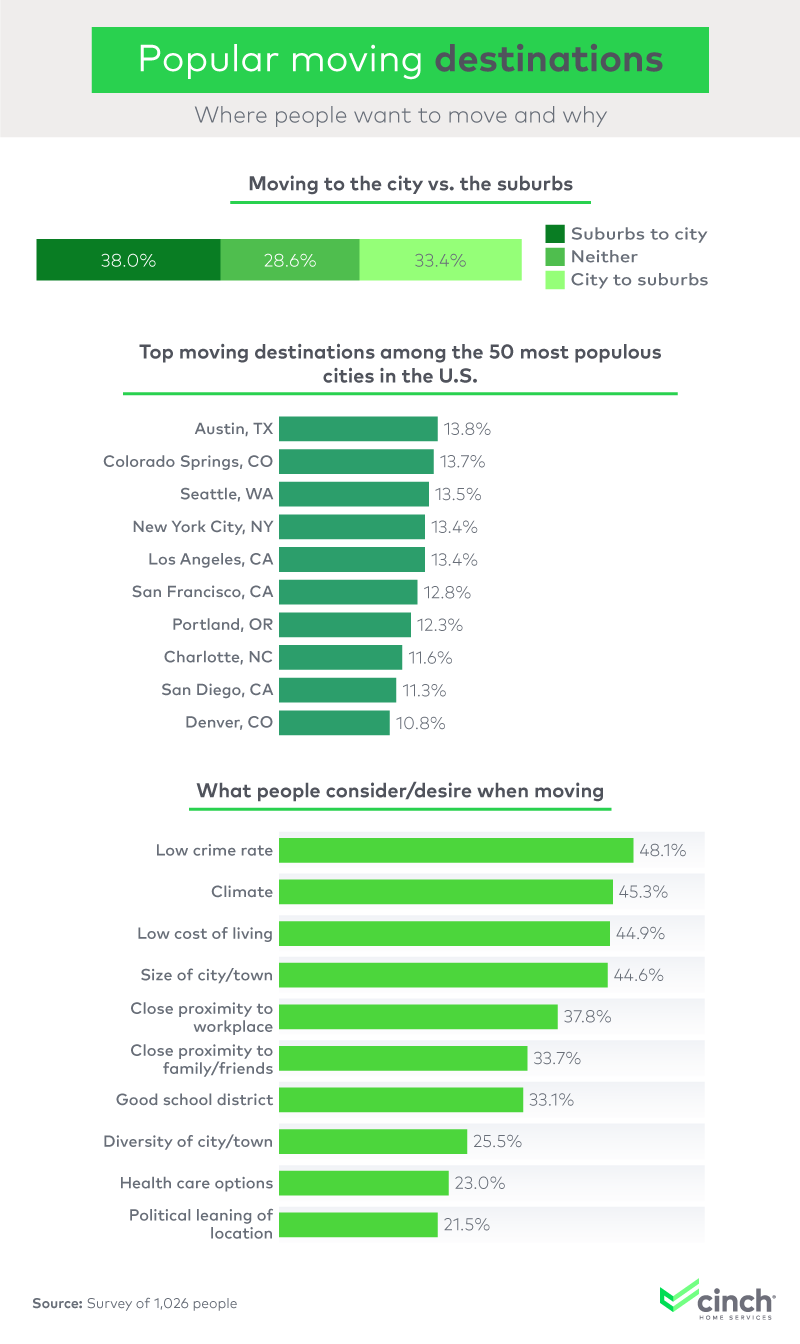Survey: Exploring perceptions of homebuying in 2021

Key takeaways
- 49% of respondents plan on buying a new home in 2021.
- 58% of potential homebuyers expect the housing market to crash in 2021.
- Austin, Texas, is the most coveted moving destination.
Housing market insights: How many Americans plan on buying a home in 2021?
People seem to really be looking forward to 2021. While you probably don't have to wonder why, there's more to next year's allure than just leaving the pandemic behind. Many people across the country – perhaps inspired by their extra time indoors in 2020 – are looking to renovate their homes or move entirely in the new year.
These two exciting prospects (renovating and moving) are definitely on the minds of Americans. We're certain of it, as we recently spoke to 1,026 people across the country. Most of these people anticipated at least some type of home improvements for next year and even had a fair amount of money saved up for it. If you're curious to know how much people are looking to spend, where they're hoping to move and even what each generation desires the most for their homes next year, keep reading.
The 2021 home search
Our investigation started with a quick look into what people generally wanted in 2021 and why. We asked respondents if they intended to purchase a house next year and broke down these responses by reason as well as generation and income.

Nearly half of people in the U.S. are actively planning to buy a new house next year. Though this was a little less likely for those earning less than $25,000 annually, even a third of this income bracket still intended to purchase something new. And even though millennials tend to grab the most attention from advertisers, baby boomers were actually the generation most ready to buy something new. Those between the ages of 56 and 74 are most often looking to downsize into their retired life and sell the current home they own. That said, the main impetus for homebuying in 2021 was actually wanting a bigger place.
Those who wanted to stay put in 2021 said they were perfectly happy with their current home (66.4%). Another 15.3% wanted to buy a new home but didn't have the money to do so, while only 5.2% preferred to rent. In fact, the concept of renting itself was the second largest impetus of change for people who were planning to buy.
But before you feel too bad for the renters of the world, know there are plenty of financial experts that can tout the benefits of renting over buying as well. From not having to pay for repair expenses to keeping your money untied, there's a lot of financial freedom involved in the renter's life.
Financing the move
The 2021 housing market was envisioned differently (and planned accordingly) across different types of buyers. The next part of our study focuses on their expectations for the market and the decisions they planned to make based off of those interpretations.

The vast majority (57.8%) of respondents did expect a housing crash. These expectations were very impactful and greatly influenced their decisions on whether to buy. Those anticipating a 2021 housing crash planned on waiting to buy until that happens.
Those who didn't foresee a crash, however, weren't planning to wait at all. Experts have tended to side with this group, explaining that home prices are actually rising quickly with the sudden wave of relocations that remote work has enabled. That said, baby boomers do currently own a third of all homes in the U.S. and are actively looking to sell in preparation for retirement.
Respondents anticipated spending an average of $166,617 on a home purchase next year alone, regardless of the terms of their mortgage. Millennials planned to outspend every other generation, in spite of their relatively small disposable income and their generation being harder hit financially by the pandemic than any other.
Improving the existing space
Those who weren't looking to move still had some plans in mind. Next, we spoke to those intending to improve their current homes instead of moving entirely.

Renovating was even more common than buying –45.1% of homeowners intended to do so in 2021. Most often, they were focused on the bathroom (47.6%) and the kitchen (46.8%). While the kitchen rationale may be fueled by practical purposes like wanting to cook more next year, change of look was actually a more common motivator than the need to upgrade or replace anything.
In spite of the economic turmoil of 2020, respondents found themselves with an average of $3,462 left for renovations on their homes, though had to dish out $4,401 on these improvements. People were roughly split, however, on whether they would spend this money on professionals or attempt the renovation themselves. While highly experienced individuals can accomplish certain DIY efforts, there are some things you should keep in mind if you choose to go this route:
- Your safety: Certain home projects can be very dangerous to attempt without proper training.
- You could destroy your home: Even the best of intentions can backfire, and you'll end up having to pay professionals even more to fix your mistakes.
- You still need a permit.
Professionals are here for a reason, so if the reasons listed above concern you, consider reaching out to one for a quote.
Location, location, locations of 2021
For those committed to moving, we wanted to know where exactly they were going. The last part of our study looked into respondents' potential whereabouts post-move in 2021, as well as the things they're hoping to get out of a particular location.

Even though we're constantly hearing about people fleeing the cities amid pandemic panic, 2021 will likely see a desire to return to these urban areas. People who wanted to move next year were actually more likely to want to move from the suburbs to the city than vice versa. Rental prices have been plummeting in famous cities in the U.S., perhaps to the point where both monthly affordability and future investment opportunities are becoming attractive to buyers and renters alike.
Austin, Texas, was the number one destination cited among respondents. Austin has been one of the fastest growing cities for the past decade, which respondents indicate is a trend that won't be slowing down anytime soon. Austin has a particularly low crime rate, which was the number one thing respondents looked for in their new destinations.
Top 5 Most Desired Styles of Home
- Modern – 49.9%
- Ranch – 34.1%
- Townhouse – 28.8%
- Farmhouse – 25.5%
- Cottage – 25.1%
Top Metropolitan Areas to Which Each Generation Wishes to Move
Millennials
- Austin, Texas – 15.7%
- Los Angeles, California – 15.7%
- New York City, New York – 15.1%
- San Francisco, California – 15.1%
- Seattle, Washington – 13.8%
Generation X
- Charlotte, North Carolina – 14.8%
- Tampa, Florida – 12.7%
- Raleigh, North Carolina – 12.2%
- Seattle, Washington – 12.2%
- Portland, Oregon – 11.8%
Baby Boomers
- Colorado Springs, Colorado – 17.1%
- Jacksonville, Florida – 17.1%
- Charlotte, North Carolina – 17.1%
- Dallas, Texas – 15.4%
- Seattle, Washington – 15.4%
Austin's new population makeup consists heavily of people relocating from both California and Florida, but according to our study, it's also primarily millennials. Nearly 16% of millennial respondents that wanted to move were considering moving to Austin. Gen X had their eyes on Charlotte, North Carolina, while baby boomers were torn between Jacksonville, Florida, and Colorado Springs.
2021 home improvements
As we move into the new year, many are taking a last look around at their surroundings. The majority intend to spruce things up, if not move entirely. Respondents have saved and planned for some exhaustive renovations or even to switch states altogether.
While it's exciting to leave 2020 behind, let's avoid any home mistakes right off the bat in 2021. Hiring a professional to help you with home renovation projects in your current or future home is definitely a good idea. Cinch Home Services offers protection plans that help you control the cost of the system and home appliance breakdowns that are bound to happen, no matter how crazy the year. If you need a repair of any kind, you can schedule it right on our site. Just head to Cinch today to see how a home warranty can provide coverage on your major home essentials and help you improve your surroundings.
Methodology and Limitations
This study uses data from a survey of 1,026 people located in the U.S. Out of all the respondents, 486 individuals were planning to buy a new home in 2021. The average age of respondents was 39 with a standard deviation of 9 years. 50.3% of respondents identified as women, while 49.7% identified as men. Outliers were removed, specifically where the amounts saved and spent on home improvements were asked.
The main limitation of this survey is the reliance on self-report, which is faced with several issues including, but not limited to, attribution, exaggeration, telescoping, and recency bias.
Fair Use Statement
With so many evidently looking to move or improve their home in 2021, it might be helpful for them to have this information shared. If you'd like to do so, you are more than welcome. Just be sure your purposes are noncommercial and that you link back to this page so its contributors can receive proper credit for their work.



